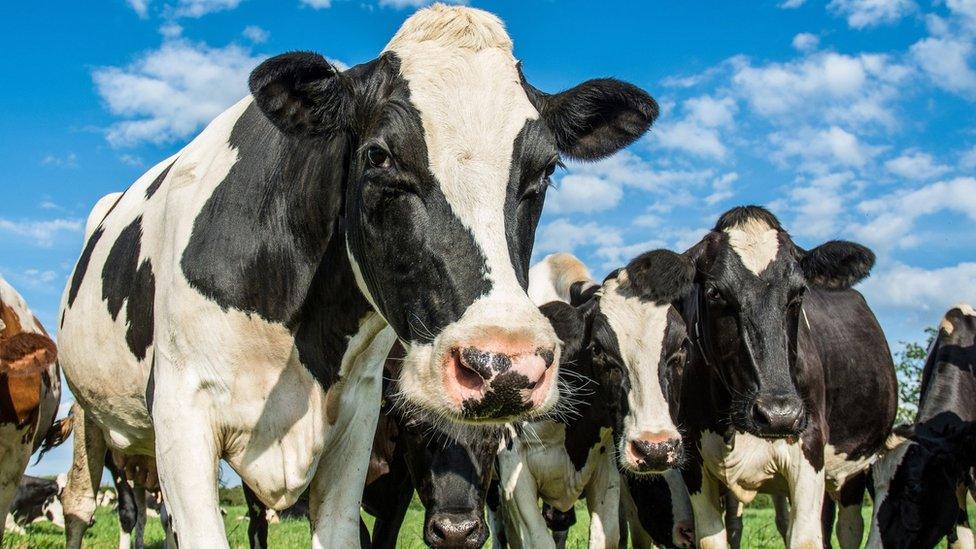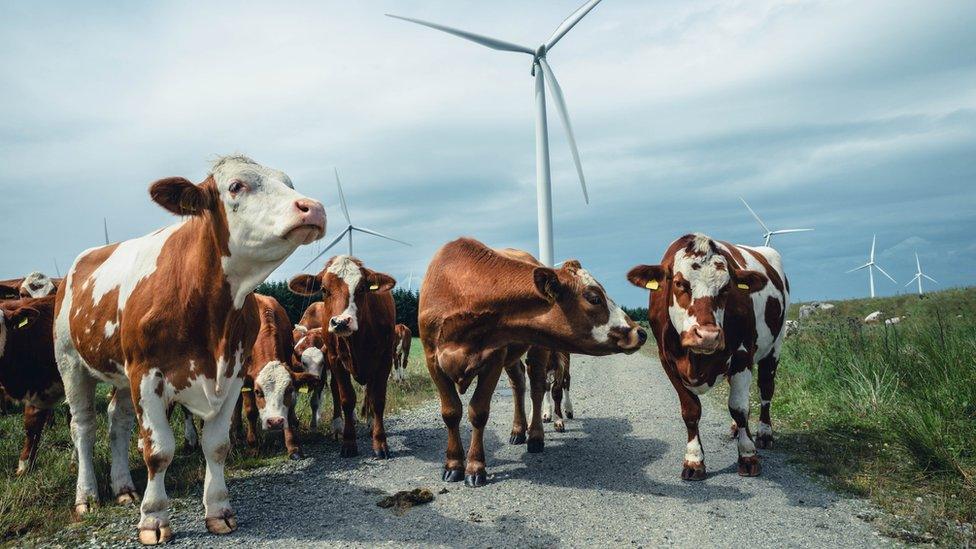Farmers in Cornwall working to reduce carbon footprint
- Published
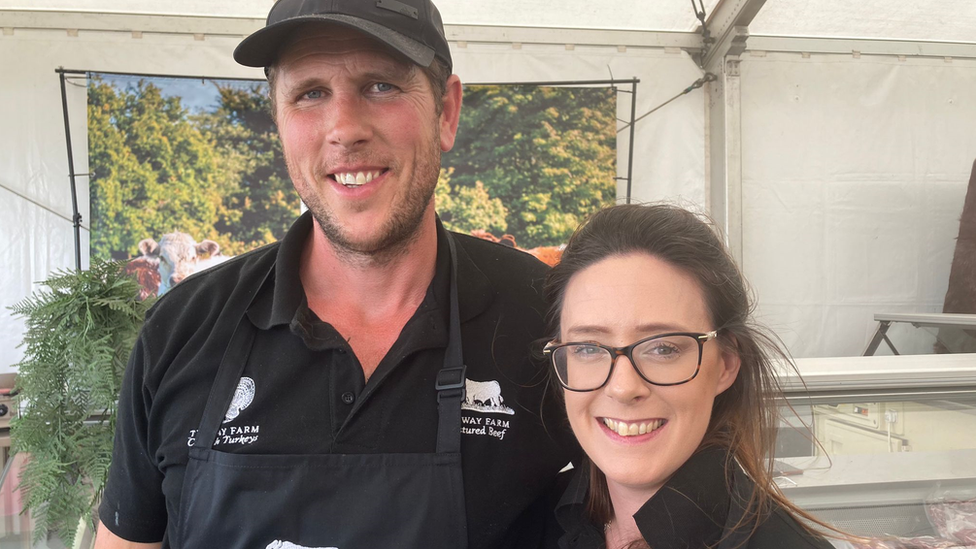
Will and Kate Martin's farm near St Austell is one of dozens signed up to the project
A project in Cornwall is helping farmers improve their impact on the environment by reducing their carbon footprints.
Three farms signed up to Farm Net Zero are aiming to become net zero within five years while 40 others are working to reduce their emissions by 30%.
The project is supporting farmers to make changes including to grazing management and compost use.
Dr Hannah Jones from Farm Net Zero said the farmers were leading the changes.
"The farmers come up with the ideas, innovations because it's got to fit within their business," she said.
"Any innovation... it's potentially going to succeed but it may also fail so for the farmer they need to comprehend that risk and we will support them with the data to make the decision whether that worked or it didn't work."
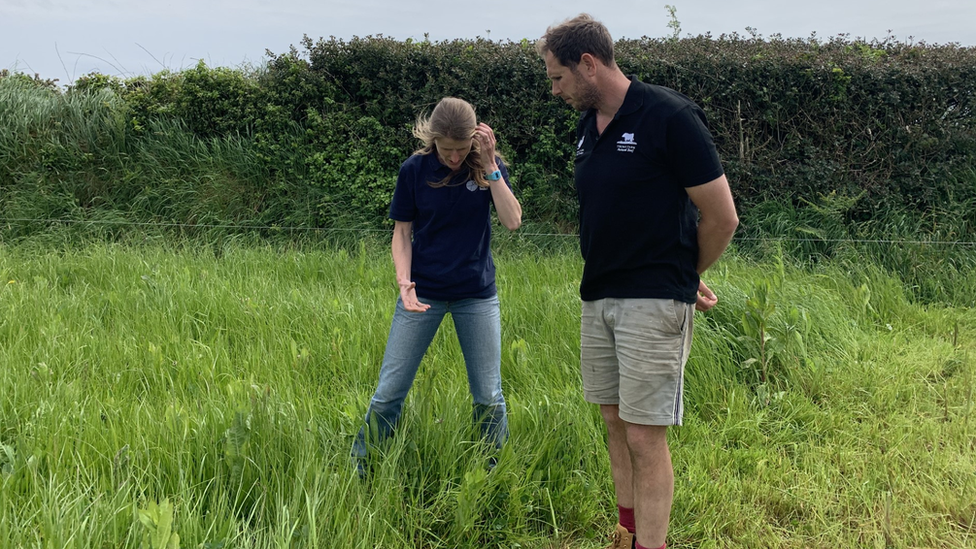
Dr Hannah Jones with one of the farmers involved in the project, Will Martin
The UK has pledged to reduce its greenhouse-gas emissions to net zero by 2050
According to the government, external in 2020, agriculture was responsible for 11% of the UK's greenhouse gas emissions.
Farm Net Zero, funded by the National Lottery's Community Fund and run in collaboration between a number of organisations including Duchy College, the Westcountry Rivers Trust and the Isles of Scilly-based community interest company Farm Carbon Toolkit (FCT), is aiming to show the contribution farming can make to achieving net zero.
Kate and Will Martin have been farming at Treway Farm near St Austell for 15 years. They joined the Farm Net Zero project a few months ago as one of 40 monitor farms aiming to reduce emissions by 30% over five years.
In recent years they have switched from feeding cattle grain to get them up to weight for slaughter to feeding them 100% grass and home-grown silage.
Their animals are now moved onto new grazing every day.

The cattle graze on herbal leys - a mix of grasses, herbs and deep rooting plants
The Martins said the system reduced the need for artificial fertiliser and improved their soil health and they were keen to see the impact it had on their carbon footprint.
"We wanted to become involved to know that we're doing the right thing for nature and that we're not a carbon emitter, we're actually sinking more carbon into our fields and it's a much more sustainable business for the future," said Mr Martin.
'Magic machines'
Mrs Martin said they sold all of their meat direct to the customer and there was a "massive difference" between the meat from grain-fed and grass-fed cattle.
"You can see quite clearly in the meat how the fat is very yellow," she said.
"That comes from the grass so you will not see that beautiful yellow fat in any animal that's had grain to eat... and that's what makes it taste good."
She said the cattle were "magic machines because they eat grass which we can't eat and turn it into nutrient-dense food".
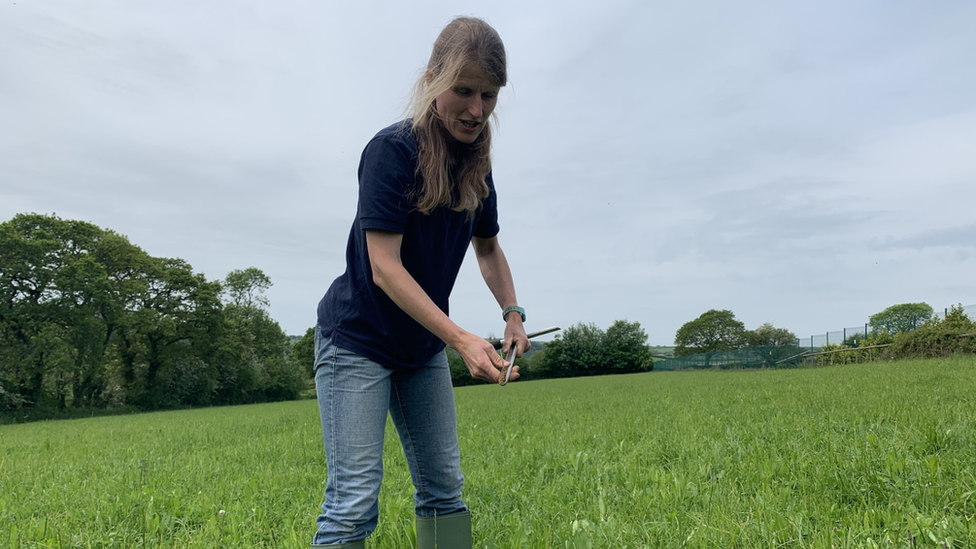
Measuring soil health and the carbon stored in it is one of the ways the project is calculating farms' progress
Dr Jones, a soil and carbon advisor with FCT, said measuring soil health and the carbon stored in it was one of the ways Farm Net Zero was calculating the progress farms were making.
Farmers are then able to calculate their carbon footprints using a specialist calculator that takes into account details about their business, including livestock, inputs such as fertilisers as well as landscape and soil carbon to show total carbon emissions and offsets.
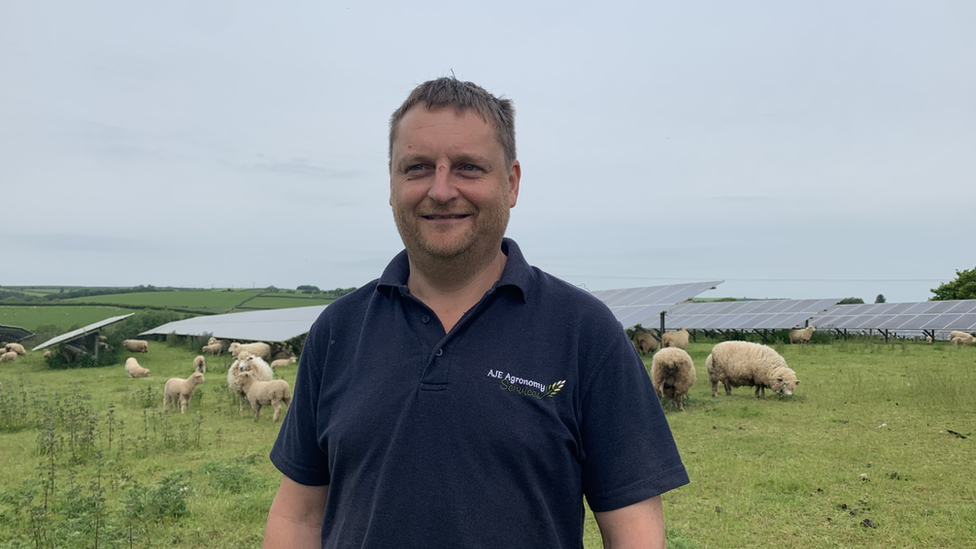
Anthony Ellis said he was really proud not to have used insecticides on his farm for the last four years
Between Looe and Liskeard is Pensipple Farm where three generations of Anthony Ellis's family have worked the land.
The mixed arable and sheep farm is already beating its target of reducing emissions by 30%.
Mr Ellis said: "Ostensibly at the moment we're carbon negative."
He said the farm had sequestered the equivalent of about 80 tonnes of carbon more than it had produced in the last two years.
There is no one change that is responsible for the reduction - instead Mr Ellis said it was about making lots of smaller changes.
His sheep rotationally graze under solar panels, farm trucks run on bio diesel, while the central heating in the house is powered by oats grown on the farm.
"We're trying to develop a farming system that's much less dependent on artificial inputs and so the sheep are a massive part of that because they're really, really good at recycling nutrients through the system, through the soil," Mr Ellis said.
'Beneficial insects'
Mr Ellis said one of the things he was "particularly proud" of was not having used insecticide on the farm for the last four years.
He said his fields were relatively small - about eight acres - and not using the chemicals meant beneficial insects had built up in the hedgerows around each field.
He said it was about "holding your nerve and trusting that nature probably has a solution for the problem".
He said: "All of these little things add up to a better farmed environment."

Wheat trial
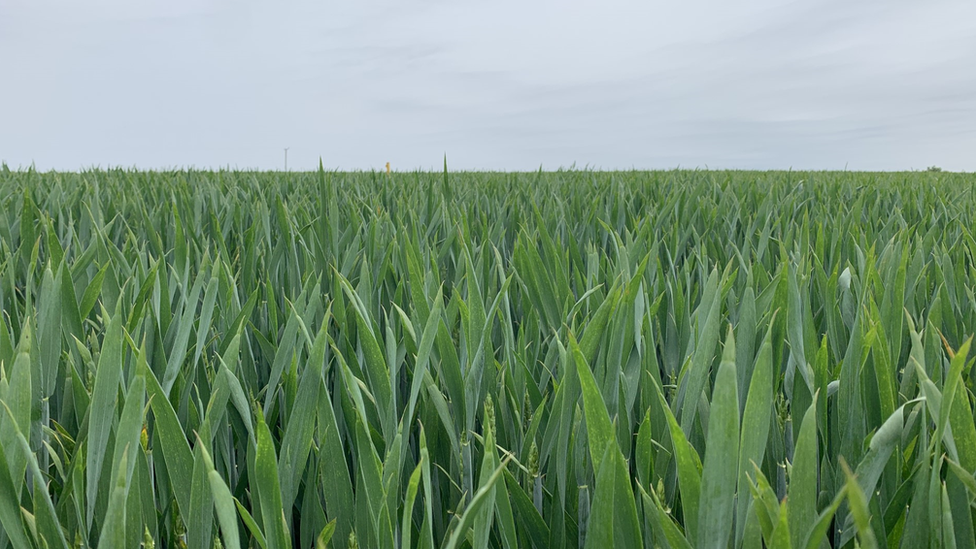
Mr Ellis is also keen to experiment.
Part of one of his wheat fields was grazed by his sheep in early February to see if that had an impact on Septoria - a disease that can reduce wheat yields.
He says it seems to be working and he plans to use the method on the whole crop next year.
"It's the disease we target above all others and what we've seen with the grazing of the sheep is that Septoria that built up over the winter was taken away by the sheep," he said
"We'll hopefully get an increased yield and a reduction in inputs."

The Farm Net Zero project is about halfway through its five years and Dr Jones said it had been "gaining momentum", with hundreds of farmers attending events and farm walks.
"We're very much learning together," she said.
"If you're on a field walk with a neighbouring farm... who has proven that that innovation that reduces carbon footprint, improves soil health, improves farm resilience, if that works, you're going to gain a lot of confidence from those other farmers and think 'right why can't I do it?'"
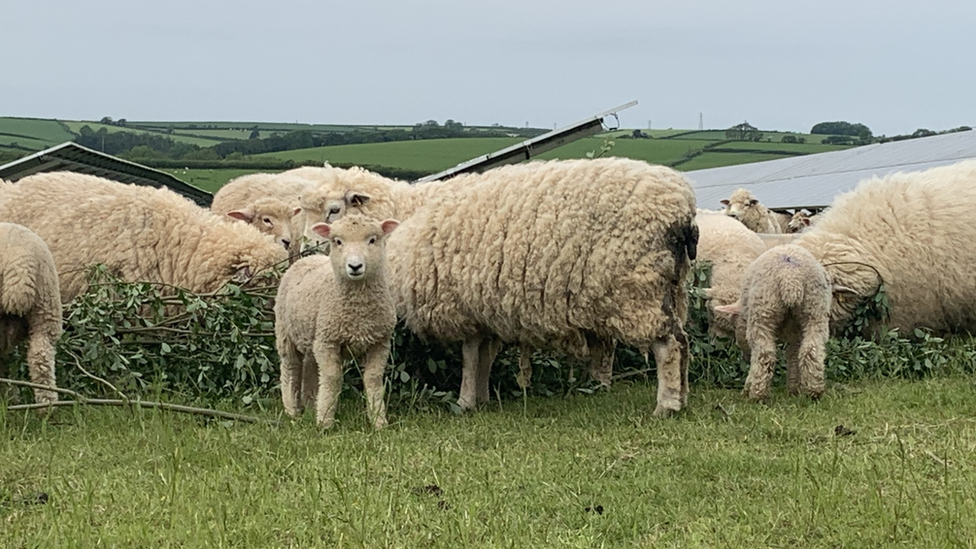
The sheep at Pensipple Farm graze under solar panels and are moved to a new paddock every three or four days
She said improved soil health would also be beneficial to the wider community.
"A higher quality soil, a higher carbon soil will hold a lot more water and in holding the water it will not only support better growth in drought but... if soils hold a lot more water we reduce flooding, there's much less run-off, which means there's less pollution, rivers and streams remain clean and there's less clean up required by the water companies."
Mr Ellis added: "For me the carbon footprint thing is kind of a secondary story really, there's a much bigger story here around sustainability and regeneration of the landscape... for me it's creating a farming system that means that in 20, 30, 40, 80 years time my kids can continue to farm here if that's what they want to do and the land will still be in a fit state to produce food."

Follow BBC News South West on Twitter, external, Facebook, external and Instagram, external. Send your story ideas to spotlight@bbc.co.uk, external
Related topics
- Published1 June 2023
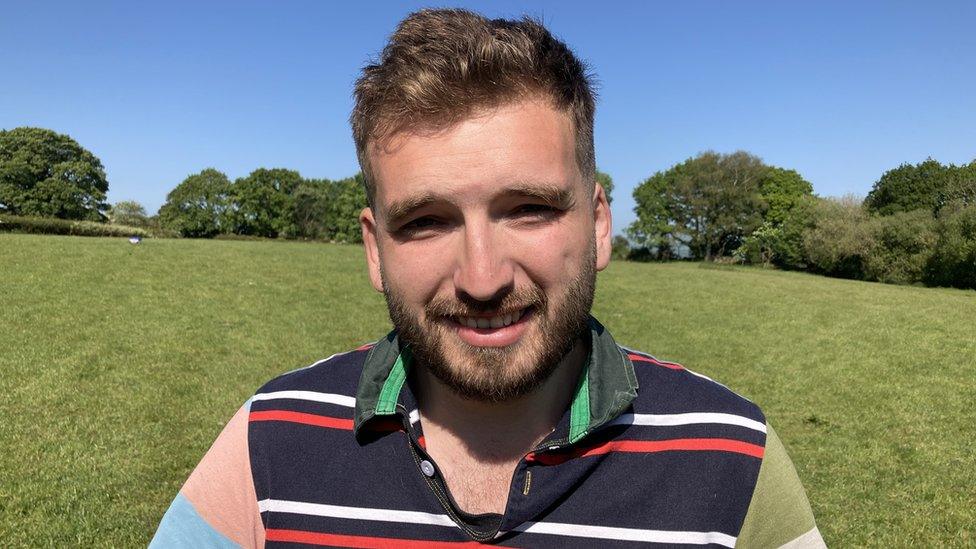
- Published8 December 2020
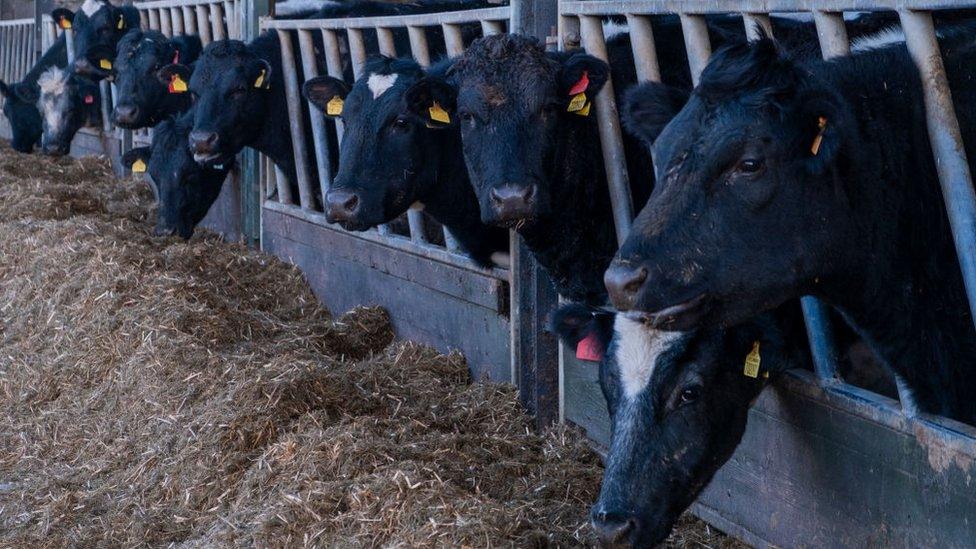
- Published10 September 2019
